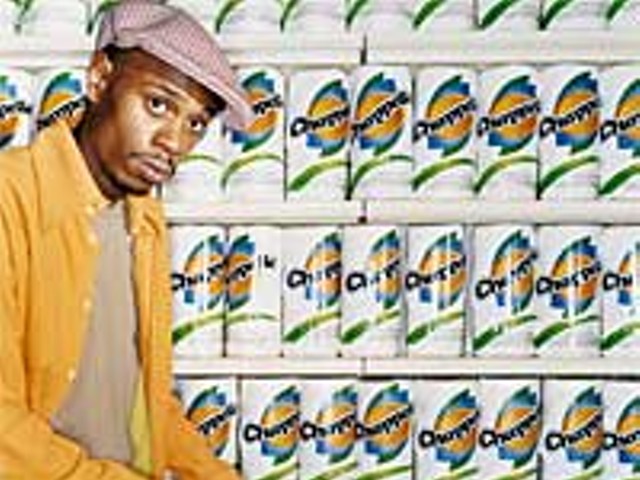On one of the most beautiful weekends of the year, Waterford resident Darwin Spaysky dragged his kayak on wheels up Nine Mile Road in Ferndale, bedecked in a snug neon pink life jacket and lime green slacks. Not far behind him, Royal Oak resident Joe Bavonese, who envisioned himself as "Mother Earth" for the day, balanced both an inflatable globe and his overstuffed faux cleavage, which threatened to burst forth from his floral-print dress.
Any other day, most would assume these two guys were drunk, crazy or both. But this wasn't just any day — for the second annual "Green Cruise," more than 300 environmentally concerned metro Detroiters walked, strutted, skated, biked, drummed and even kayaked their way down Nine Mile.
Royal Oak's chapter of the Sierra Club, a nonprofit national environmental organization, started the event last year, scheduling it a week before the annual Woodward Dream Cruise. Their "green" cruise promotes alternative modes of transport and healthier, cleaner living. Sierra Club conservation organizer Melissa Damaschke says their mantra is "No fossil fuels allowed."
Before the 1 p.m. Saturday start time, the "cruisers" began converging in the Ferndale Public Library parking lot, many bearing picket signs and the occasional green feather boa, filling the parking spaces with bikes of all kinds. Parking meters were plastered with green signs printed with health and exercise facts. Tents provided refreshments, donation opportunities and helpful information for Michigan bikers. Police cars escorted the alt-parade along Nine Mile, crossing Woodward Avenue and then looping back.
Todd Scott, 42, of Royal Oak, is the executive director for the Michigan Mountain Biking Association. He sees the Green Cruise as a throwback to the Woodward Avenue of yesteryear.
"If you look back on how Woodward was originally formed, it was originally a non-motorized pathway connecting Detroit to Pontiac, and it kind of got taken over by motor vehicles and even the railroads," Scott says. "It's kind of interesting to see this green cruise, and to retake the original intent of Woodward."
Detroit resident Jason Merrill is a bike messenger for Detroit's Delivery Express, located in the Guardian Building. He's also a volunteer mechanic for Back Alley Bikes, Detroit's free bicycle recycling and repair center, where he helps repair bikes old and new. Customers can "earn" a free bike if they spend time helping and educating others on bike repair and safety. Merrill swears that bicycles are the ultimate mode of transportation.
"In terms of simple efficiency, I can get from point A to point B just as fast as anyone in a car in a three mile radius from where I'm sitting right now easily," Merrill says. "Furthermore, I won't get angry because the lights didn't go my way, I won't get upset because some guy is acting like a jerk, and I won't get frustrated when I can't find a parking space."
Each year, more than 1 million people, many of them out-of-staters, and their shiny, vintage gas-guzzlers descend on metro Detroit for the Dream Cruise — often to the chagrin of local residents and businesses.
Jeremy Haberman, owner of the Magic Bag and the Bosco in Ferndale, fights for small businesses every year during the Dream Cruise by posting mocking slogans on the marquees of his businesses. "It's ridiculous" Haberman says. "Ninety-five percent of businesses are either forced to close their doors or will make low profits that day."
During past cruises, police have closed the turnarounds on Woodward, aggravating that week's business problems. Haberman suggests moving the dream cruise to Labor Day weekend, when business is already slow.
While Green Cruise organizers insist their event isn't a protest of the Dream Cruise, the issue of bicycles vs. cars has always been a touchy subject, particularly because of safety concerns. In July, a 50-year-old Detroit man was killed when his bicycle crashed into a city bus. Under current Michigan laws, cyclists must follow the same rules as cars — but the issue of "sharing" can turn deadly if both parties don't comply.
According to the Michigan Department of Community Health and the League of Michigan Bicyclists, more than half of all urban car-bike crashes are caused by motorists who fail to yield to cyclists, pass unsafely, turn sharply in front of cyclists, drive too fast for conditions or open doors in cyclists' paths.
In response, a new bill backed by state Sen. Michelle McManus (R-Lake Leelanau) passed this summer in both the House of Representatives and the Senate. It added specific provisions to make the roads safer for cyclists. Requirements that forced cyclists to the extreme right on the road while riding were given new exceptions so cyclists can maneuver more freely about the road when needed. The bill is awaiting the signature of Gov. Jennifer Granholm, who received it on Aug. 3, 2006. Scott hopes the new law and adding more bike paths will make cycling a viable transportation option in metro Detroit.
"More and more people want to lead an active lifestyle," he says. "I can eat a lot more food and not have to worry about it. A long time ago, perhaps 100 years ago, exercise was something you just did; it was a part of your life. I think we're coming back toward that now. Being able to bike a couple miles to the store — your exercise blends in with your normal life."
And with the ever-soaring prices at the pump, that dusty old 10-speed in the garage is beginning to look more and more appealing.
"Gas prices should be higher and higher and higher," Merrill says. "The higher they go the happier I am. It offers people that realistic disincentive. It's kind of an economic motivator to consider alternatives."
Alison Bergsieker is an editorial intern for Metro Times. Send comments to [email protected]




